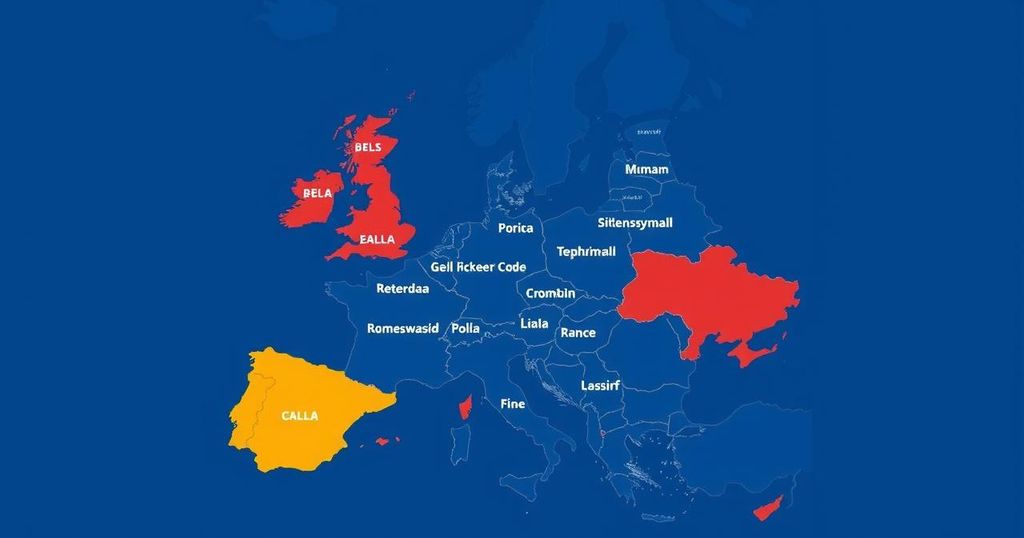economics
AMERICA, ASIA, ATLANTIC, BELGIUM, BRUSSELS, CENTRE FOR EUROPEAN REFORM, CHINA, DONALD TRUMP, ECONOMICS, EU, EUROPE, EUROPE/ASIA, EUROPEAN UNION, FISCAL POLICY, FORTUNE, GEOPOLITICS, GERMANY, HARRIS, ING, KAMAL, MEXICO, NORTH AMERICA, RUSSIA, TARIFFS, U. S, UKRAINE, US, US PRESIDENTIAL ELECTION, ZACH MEYERS
Jamal Walker
0 Comments
Implications of the U.S. Election on Europe’s Future
The upcoming U.S. election is set to significantly impact Europe, especially regarding trade tariffs, business uncertainty, and defense alliances. Candidates Donald Trump and Kamala Harris present contrasting visions that could reshape Europe’s economic landscape and geopolitical strategies.
As the United States approaches its election day, the competition intensifies between presidential candidates Donald Trump and Kamala Harris, with the outcome poised to significantly influence not only America but also Europe. The continent has increasingly relied on the U.S. for trade and security, particularly in light of economic challenges, the rise of right-wing nationalism, and ongoing security risks stemming from the conflict in Ukraine. The election outcome could lead to three major changes impacting Europe: 1. Increased Tariffs: The U.S. remains the European Union’s largest trading partner, with a trade relationship valued in trillions of dollars, supporting millions of jobs. If elected, Donald Trump has expressed plans to impose steep tariffs of 10% to 20% on European imports, a move that could strain EU economies and lead to retaliatory measures. Experts suggest this could substantially hinder economic growth, with potential harm to nations like Germany. Conversely, Kamala Harris may advocate for more diplomatic trade relations, pressing Europe to reconsider its ties with China. 2. Business Uncertainty: The election is seen as a potential catalyst for sweeping changes in the global economic and political climate. Kamala Harris is viewed as a continuity candidate, while Trump’s win could indicate a departure from current diplomatic norms. Concerns are rife regarding Europe’s technological competitiveness and its capacity to innovate in response to pressure from U.S. tech companies and regulations. European policymakers carry the responsibility of fostering an environment conducive to growth and innovation. 3. Defense Dynamics: Geopolitics remains a crucial area of difference between the candidates. The ongoing conflict in Ukraine has necessitated that Europe relies on American military support. Trump’s previous threats to withdraw from NATO and his leniency towards Russian aggression could destabilize European defense strategies. On the other hand, Kamala Harris promises to uphold traditional alliances and support international commitments regarding defense and Ukraine.
The U.S. election plays a pivotal role in shaping not only American domestic policy but also international relations, especially with Europe. Historically, the partnership between the U.S. and Europe has been built on trade and defense collaborations. Given the geopolitical climate, including Russia’s aggression and the rise of nationalism, the implications of the election are particularly significant for European nations that are reliant on U.S. support. The candidates’ differing visions for foreign policy, trade relations, and military commitments will likely dictate the future trajectory of Europe’s political and economic landscape.
The U.S. presidential election stands as a crucial juncture for Europe, with potential outcomes hinging on the policy directions of Donald Trump or Kamala Harris. Increased tariffs could stifle economic growth, instigate business uncertainties, and reshape defense strategies within Europe. The stakes are high as European nations prepare to adapt to the implications of American electoral outcomes, reinforcing the need for stability and supportive transatlantic relations.
Original Source: fortune.com




Post Comment